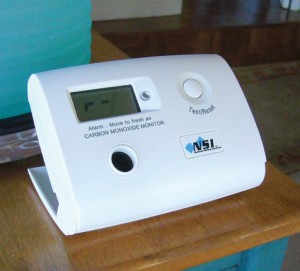Low-Level Carbon Monoxide Monitor
National Safety Institute Model 3000

NSI 3000 Low Level Carbon Monoxide Monitor
Protect Your Entire Family With NSI’s (National Safety Institute’s) Professional Grade Low-Level Carbon Monoxide (CO) Monitor.
Provides protection for all age groups and conditions, especially infants, children, the elderly, and highly sensitive or ill people. Other detectors barely provide minimal protection for healthy adults.
Lets you know there’s a problem before reaching dangerous, even deadly CO levels, long before the other detectors even begin to work.
NSI’s Model 3000 Monitors employ the same electro-chemical sensor technology found in professional CO Analyzers that cost thousands of dollars. These monitors are calibrated using CO, not electronic guesswork!
Ask your NCI-Certified Professional how an NSI 3000 Monitor can help keep your home safe and healthy today!
| THE NSI 3000 OFFERS REAL PROTECTION |
|
|
|
|
|
|
|
|
|
Facts You Should Know To Protect Your Family

The NSI low-level monitor senses CO levels as low as 5 ppm (parts per million). Infants, children, elderly, people with respiratory or heart ailments are provided little or no protection from deadly CO with standard alarms. Long-term exposure to low-level CO above 15 ppm can cause illness and even permanent disabilities.
What about the other “detectors” sold at retailers and home centers?
Store-bought detectors don’t alarm until unsafe levels of 70 ppm or higher are present at the unit for 3-1/2 hours! By then it may be too late. Plug-in models don’t always allow for proper placement and don’t work during power outages. The NSI 3000 is battery powered for 24/7 protection.
Why is the NSI 3000 more expensive than the others?
Accurate, low-level CO detection requires more expensive components and quality control. The NSI 3000 CO monitor uses the same technology and sensors as in professional-grade CO analyzers used by contractors, fire departments, and utilities. Plus NSI’s unique Continuous Scan mode lets you know the monitor is operational 24/7!

As with smoke detectors, you should have one monitor installed on every level of your home. Even a single story home may need two; one at each end.
Where should I place the NSI monitor?
CO is lighter than air. Monitors should be mounted at eye level and no lower. They should be placed in an area with good air circulation. If you have only one monitor it should be placed near the master bedroom. Additional locations include your kitchen, nursery, basement, rooms with fireplaces or gas logs, and near your heating system and/or hot water tank.Your professional installation contractor will determine the best location in your home.
What should I do if my monitor goes off?
Call your NCI-Certified Professional at any level below 70 ppm, unless you have symptoms. CO exposure can cause nausea, severe headache, shortness of breath, chest pain, blurred vision, and dizziness. If you experience these symptoms call 911 and leave the house immediately. Above 70 ppm, evacuate immediately. If you have symptoms, call 911 from a neighbors house. Call your utility to turn off the equipment until your NCI-Certified Professional can investigate the source of carbon monoxide.
